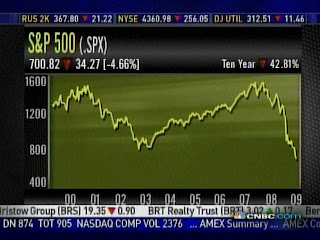As you may recall, I discussed market behavior when October employment numbers were released:
The unemployment numbers were higher than expected and the national unemployment rate rose to a high of 10.2%, to which the market responded by rallying and moving higher. The reason given by financial main stream media was higher unemployment means interest rates will likely be kept low for a longer period.
So in their Bizzaro universe, higher unemployment is reason to celebrate in the stock market.
Now there has to be two sides to every equation, which means that if the jobs number showed lower unemployment, the market move should be negative (higher interest rates), right? Well, my Bipolar Market Theory predicts that the market will move in a certain direction independent of any new information.
Now last Friday the jobs number was much lower than expected- only 11K jobs lost for the month and the national unemployment number dropped to 10%
How did the market respond? Well if you guessed it went down since this means interest rates will be going up, you'd be wrong. The market instead rallied to make another new high for the year and ended positive for the day. The financial media, as expected, linked the rally to positive signs of the recovery taking place, forgetting all about interest rates.
So in summing up we have the following:
1) Higher unemployment triggers a market rally.
2) Lower unemployment triggers a market rally.
3) The financial mainstream media will try to make both situations seem logical and expected.
From this we can conclude:
1) Bipolar market theory has been verified.
2) Financial main stream media are basically idiots and should never be looked at for insight.
3) The market isn't trading on fundamentals at this time, which makes it equivalent to Wyle E. Coyote running off of a cliff and not falling because he hasn't realized it yet. Technical analysis is best suited for use now and one needs to be alert to any signs of bipolar market sentiment shifting. Once the sentiment shifts negative, you will see the market continue to fall regardless of news in the same fashion as it did going up.

012.bmp)
006.bmp)


